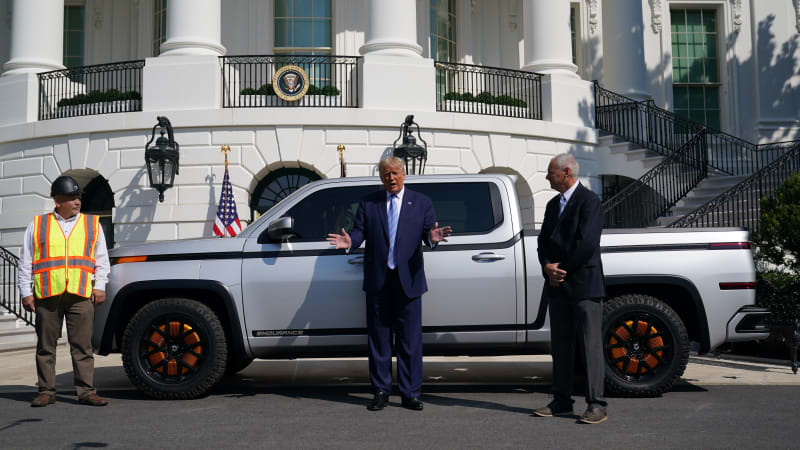'You can't just go to electric': Trump sounds off on EV transition as automakers warn on demand

If former President Donald Trump wins another term in November’s election, Biden’s electric vehicle policies could be tossed into the trash.
Trump, the presumptive Republican nominee after Nikki Haley suspended her campaign last week, once again repeated his claims that EVs are not ready for prime time, and structural issues still exist for widespread adoption.
“I’m all for electric cars but you have to have all of the alternatives also,” Trump said in an interview with CNBC on Monday morning. “First of all they don’t go far, they cost too much, and they’re all going to be made in China.”
Trump has said in the past that EVs are a “hoax” and that an EV transformation will destroy the US auto industry and kill jobs. He has promised to reverse Biden’s EV policies if he returns to office and he’s now one step closer to doing so.
Trump added some choice words for the people behind the “Biden all-electric mandate” in the CNBC interview, but he also voiced concerns over the infrastructure issues that exist in the US for an all-electric transformation.
“You can’t just go to electric,” Trump said, adding that the grid isn’t up to the challenges of production and distribution.
What this means for the auto sector — and EVs
Trump is incorrect about criticism of the grid’s electrical output, but his critique of the distribution of energy (i.e., charging) is a continued concern for drivers and automakers.
It’s why the automakers are doing all they can to improve the infrastructure issue by joining forces with Tesla in one instance and starting their own joint venture to expand charging in another.
But the distribution issues Trump cites would be largely problems caused by a Trump presidency in and of itself.
The biggest threat to the transformation is the cutting off of the federal spigot of funds for this key infrastructure — namely the Inflation Reduction Act’s federal EV tax credit and the Bipartisan Infrastructure Law’s $7.5 billion earmarked to build an EV charger network. If Trump is successful in rolling back one or both of these landmark initiatives, an electric transformation in the US would be difficult to achieve.
Automakers are also seeing the writing on the wall coming from their own consumers, who echo some of the concerns Trump has with EVs.
The combination of high rates and serious price premiums over comparable gas-powered cars and hybrids has led to stalling sales. And now Ford, GM, and even Tesla are warning about the slumping demand continuing into 2024.
Trump’s desire to see more “alternatives” is already happening because of this, with Ford pivoting deeper into its hybrids — the Maverick pickup and F-150 hybrids chief among them — and reports that GM is looking to add hybrids to its product portfolio ASAP. (It currently only has one: the Corvette E-Ray.)
Stellantis CEO Carlos Tavares told Yahoo Finance at a roundtable meeting last month that the automaker was already game-planning for either a Trump or a Biden election win, with “multi-energy platforms” that can accommodate both fully electric or a more traditional gas-powered option with the same model. The upcoming Dodge Charger muscle car is an example of that strategy with two powertrains.
As for Tesla, going the hybrid route is not a possibility. But CEO Elon Musk still has a friend in the former president, at least for now.
“I’ve been friendly with him over the years, I’ve helped [him] when I was president; I’ve liked him,” Trump said when asked about Musk and a meeting he had with the Tesla CEO at Mar-a-Lago this past weekend. “We obviously have opposing views on a minor subject I’ll call electric cars.”
Whether Trump carves out some kind of special treatment for his friend Musk or maintains the EV tax credit for fully electric vehicles like those made in the US by Tesla is anyone’s guess, but that scenario looks less and less likely as November approaches.
Pras Subramanian is a reporter for Yahoo Finance. You can follow him on Twitter and on Instagram.
Click here for the latest stock market news and in-depth analysis, including events that move stocks
Read the latest financial and business news from Yahoo Finance



